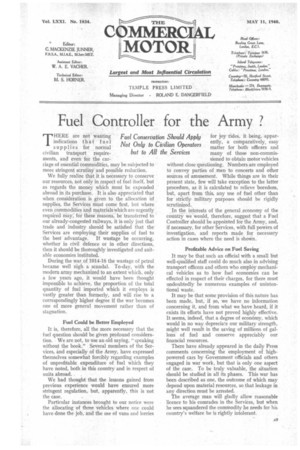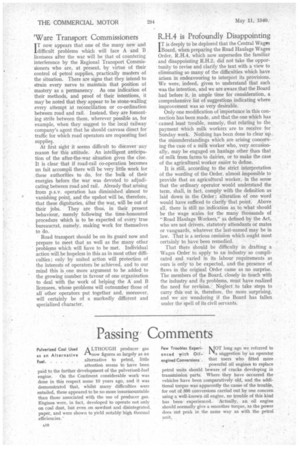Fuel Controller for the Army ?
Page 11

Page 12

If you've noticed an error in this article please click here to report it so we can fix it.
THERE are not wanting indications that fuel supplies for normal civilian transport requirements, and even for the carriage of essential commodities, may be subjected to more stringent scrutiny and possible reduction.
We fully realize that it is necessary to conserve our resources, not only in respect of fuel itself, but as regards the money which must be expended abroad in its purchase. It is also appreciated that when consideration is given to the allocation of supplies, the Services must come first, but where even commodities and materials which are urgently required may for these reasons, be transferred to our already-congested railways, it is only just that trade and industry should he satisfied that the Services are employing their supplies of fuel to the best advantage. If wastage be occurring, whether in civil defence or in other directions, then it should be thoroughly investigated and suitable economies instituted.
During the war of 1914-18 the wastage of petrol became well nigh a scandal. To-day, with the modern army mechanized to an extent which, only a few years ago, it would have been thought impossible to achieve, the proportion of the total quantity of fuel imported which it employs is vastly greater than formerly, and will rise to a correspondingly higher degree if the war becomes one of more general movement rather than of stagnation.
Fuel Could be Better Employed It is, therefore, all the more necessary that the • fuel question should be given profound consideration. We are not, to use an old saying, " speaking without the book." Several members of the Services, a.nd especially of the Army, have expressed themselves somewhat forcibly regarding examples of unprofitable expenditure of fuel which they have noted, both in this country and in respect of units abroad.
We had thought that the lessons gained from previous experience would have ensured more stringent regulation, but, apparently, this is not the case.
Particular instances brought to our notice were the allocating of three vehicles where one could have done the job, and the use of vans and lorries for joy rides, it being, apparently, a comparatively, easy matter for both officers and many of those non-commissioned to obtain motor vehicles without close questioning. Numbers are employed to convey parties of men to concerts and other sources of amusement. While things are in their present state, few will take exception to the latter procedure, as it is calculated to relieve boredom, but, apart from this, any use of fuel other than for strictly, military purposes should be rigidly scrutinized.
In the interests of the general _economy of the country we would, therefore, suggest that a Fuel Controller should be appointed for the Army, and, if necessary, for other Services, with full powers of investigation, and reports made for necessary action in cases where the need is shown, Profitable Advice on Fuel Saving It may be that such an official with a small but well-qualified staff could do much also in advising transport officers and others who employ mechanical vehicles as to how fuel economies can be effected in respect of their charges, for there must undoubtedly be numerous examples of unintentional waste.
It may be that some provision of this nature has been made, but, if so, we have no information concerning it, and from what we have heard, if it exists its efforts have not proved highly effective. It seems, indeed, that a degree of economy, which would in no way depreciate our military strength, might well result in the saving of millions of gallons of fuel and conserve appreciably our financial resources.
There have already appeared in the daily Press comments concerning the employment of highpowered cars by Government officials and others engaged in war work, but that is only one aspect of the case. To be truly valuable, the situation should be studied in all its phases. This war has been described as one, the outcome of which may depend upon material resources, so that leakage in any direction must be arrested.
The average man will gladly allow reasonable licence to his comrades in the Services, but when be sees squandered the commodity he needs for his country's welfare he is rightly intolerant_ 'Ware Transport Commissioners I T now appears that one of the many new and difficult problems which will face A and B licensees after the war will be that of countering interference by the Regional Transport Commissioners who are, at present, by virtue of their control of petrol supplies, practically masters of the situation. There are signs that they intend to strain every nerve to maintain that position of mastery as a permanency As one indication of their methods, and proof of their intentions, it may be noted that they appear to be stone-walling every attempt at reconciliation or co-ordination between road and rail. Instead, they are fomenting strife between them, wherever possible as, for example, when they suggest to the local railway company's agent that he should canvass direct for traffic for which road operators are requesting fuel suppliq. At first sight it seems difficult to discover any reason for this attitude. Art intelligent anticipation of the after-the-war situation gives the clue. It is clear that if road-rail co-operation becomes un fait accompli there will be very little work for these authorities to do, for the bulk of their energies before the war was devoted to adjudicating between road and rail. Already that arising from p.s.v. operation has diminished almost to vanishing point, and the upshot will be, therefore, that these dignitaries, after the war, will be out of their jobs. They are thus, in their present behaviour, merely following the time-honoured procedure which is to be expected of every true bureaucrat, namely, making work for themselves to do. Road transport should be on its guard now and prepare to meet that as well as the many other problems which will have to be met. Individual action will be hopeless in this as in most other difficulties; only by united action will protection of the interests of operators be achieved, and to our mind this is one more argument to be added to the growing number in favour of one organization to deal with the work of helping the A and B licensees, whose problems will outnumber those of all other operators put together and, moreover, will certainly be of a markedly different and specialized character. R.F1.4 is Profoundly Disappointing IT is deeply to be deplored that the Central Wages Board, when preparing the Road Haulage Wages Order, R.H.4, which now supersedes the familiar and disappointing R.H.2, did not take the opportunity to revise and clarify the text with a view to eliminating so many of the difficulties which have arisen in endeavouring to interpret its provisions. We were, indeed, given to understand that such was the intention, and we are aware that the Board had before it, in ample time for consideration, a comprehensive list of suggestions indicating where improvement was so very desirable. Only one modification of importance in this connection has been made, and that the one which has caused least trouble, namely, that relating to the. payment Which milk workers are to receive for Sunday work. Nothing has been done to clear up the misunderstandings which are arising concerning the case of a milk worker who, very occasionally, may be engaged on haulage other than that of milk from farms to dairies, or to make the case of the agricultural worker easier to define. It is still, according to the strict interpretation of the wording of the Order, almost impossible to provide that an agricultural worker, in the sense that the ordinary operator would understand the term, shall, in fact, comply with the definition as laid down in the Order; alteration of one word would have sufficed to clarify that point. Above all, there is still no indication as to what should be the wage scales for the many thousands of "Road Haulage Workers," as defined by the Act, who are not drivers, statutory attendants or mates or vanguards, whatever the last-named may be in law. That is a serious omission which ought most certainly to have been remedied. That there should be difficulty in drafting a Wages Order to apply to an industry so complicated and varied in its labour requirements as ours is only to be expected, and the presence of flaws in the original Order came as no surprise. The members of the Board, closely in touch with the industry and its problems, must have realized the need for revision. Neglect to take steps to carry this out is, therefore, the more surprising, and we are wondering if the Board has fallen under the spell of its civil servants.




























































